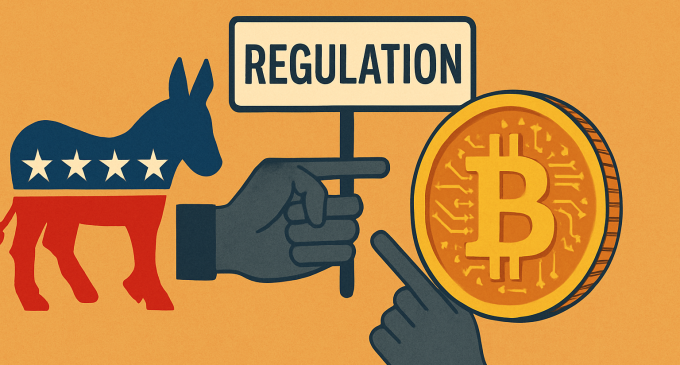
Introduction
The tension between Washington lawmakers and the decentralized world of cryptocurrencies has reached a new high. On March 24, 2025, Bitcoin Magazine published a provocative article titled “Democrats Propose More Bad Bitcoin And Crypto Regulation”, shedding light on fresh legislation from Democratic lawmakers that has stirred alarm across the crypto industry. Critics argue that this new regulatory initiative could stifle innovation, burden small businesses, and derail America’s position as a global blockchain leader.
This article explores the contents of the proposed legislation, its motivations, the reaction from key crypto industry figures, and how it could affect the landscape of digital assets in the coming years. While some hail it as a necessary step toward protecting consumers, others claim it’s a classic case of government overreach into a still-developing sector. What’s at stake is not just market stability, but also the future of technological freedom and financial decentralization.
Understanding The Proposed Legislation
At the heart of the controversy lies a multi-faceted regulatory bill introduced by a group of Democratic senators and representatives. Though the full text of the bill is yet to be released to the public, early details suggest sweeping measures aimed at tightening oversight over cryptocurrencies, decentralized finance (DeFi), crypto exchanges, and digital wallets.
Main Components of the Proposal
Mandatory Registration for All Crypto Entities
The proposal mandates that all cryptocurrency companies — from exchanges to DeFi protocols — register with U.S. regulatory bodies such as the SEC (Securities and Exchange Commission) or CFTC (Commodity Futures Trading Commission). This includes small blockchain startups, which previously operated in regulatory gray zones.
Stricter KYC and AML Requirements
The bill expands Know Your Customer (KYC) and Anti-Money Laundering (AML) obligations, forcing even peer-to-peer platforms and wallet providers to verify identities and monitor transactions, increasing operational costs and complexity.
Limitations on Anonymous Transactions
One of the more controversial features includes a push to prohibit or heavily restrict anonymous crypto transactions. This could effectively outlaw privacy coins like Monero and Zcash and impose tracking mechanisms on platforms like Ethereum.
Taxation and Transaction Reporting
The proposed regulation aims to enforce real-time transaction reporting to the IRS, a move that raises significant privacy and logistical concerns within the crypto community.
Ban on Unregistered Stablecoins
The legislation seeks to ban the issuance and circulation of stablecoins that are not explicitly backed and regulated by authorized financial institutions. This could impact major players like Tether (USDT) and USD Coin (USDC).
The Justification: Consumer Protection Or Control?
Democratic lawmakers claim the regulation is a response to increasing crypto fraud, investor losses, and cybercrime. High-profile incidents such as the FTX collapse, the Terra-LUNA crash, and countless phishing and rug-pull schemes have undeniably left many retail investors devastated.
The stated objective is to “bring clarity, transparency, and security to the crypto space.” Proponents argue that cryptocurrencies have become too large to remain unregulated, with trillions of dollars circulating in markets with limited oversight.
However, critics argue that the bill goes far beyond protection — they see it as a targeted attack on decentralization. By forcing compliance with centralized regulations, they argue, the government is undermining the core ethos of blockchain technology: freedom from centralized control.
Industry Reaction: Shockwaves Through Silicon Valley And Beyond
Unsurprisingly, the proposal has been met with strong opposition from crypto entrepreneurs, investors, and blockchain developers. Many see it as the beginning of a larger campaign to delegitimize and dismantle the decentralized economy.
Voices from the Industry
Cynthia Lummis, a pro-crypto U.S. Senator, tweeted that the bill was “a danger to digital innovation” and “a move that will push Web3 jobs overseas.”
Brian Armstrong, CEO of Coinbase, criticized the legislation as “poorly informed and disconnected from how blockchain actually works.” He warned that such a law could lead to an exodus of crypto companies from the U.S. to more favorable jurisdictions like Switzerland, Singapore, or the UAE.
Jack Dorsey, Bitcoin advocate and co-founder of Twitter, added that “crypto should not be regulated like banks because it’s not a bank — it’s something fundamentally different.”
Concerns from Small Businesses
While large companies may have the resources to adapt, the biggest impact will likely be felt by small blockchain startups and open-source developers. Many of these operate on limited budgets, often bootstrapped by community funding or volunteer work.
Forcing them to register, conduct full KYC processes, and hire compliance officers could effectively shut them down. This raises valid questions about whether the U.S. is building a two-tier crypto system — one that favors Wall Street and institutional players while choking grassroots innovation.
Global Comparison: Where The U.S. Stands?
Internationally, the regulatory landscape for crypto is varied but gradually maturing. The European Union has introduced MiCA (Markets in Crypto-Assets Regulation), which balances investor protection with innovation. The UK has taken steps toward licensing crypto exchanges and supporting blockchain-based financial services. Even countries like Japan and South Korea have found ways to integrate cryptocurrencies into their financial systems while managing risk.
In contrast, the U.S. has lagged in creating clear and consistent frameworks. Critics argue that the newly proposed regulation continues this pattern — reactionary, vague, and adversarial rather than collaborative.
Potential Implications For Innovation And Economic Growth
The blockchain industry is not just about cryptocurrency. It spans industries including supply chain, healthcare, logistics, identity management, voting systems, and more. The proposed regulation could have chilling effects across all these domains.
Brain Drain And Innovation Flight
If passed in its current form, the legislation could drive talent away from the U.S., similar to what happened with the semiconductor and green energy sectors in earlier decades. Developers, startups, and investors may choose to relocate to countries with friendlier regulatory environments, leading to a loss of tax revenue, intellectual capital, and technological leadership.
Impact on Decentralized Finance (DeFi)
DeFi — one of the fastest-growing segments of blockchain — would be hit particularly hard. These platforms operate on smart contracts without central control. Mandating KYC compliance or transaction censorship would require a fundamental redesign of protocols like Uniswap, Aave, or Compound, which may be infeasible or philosophically contradictory to their core mission.
Civil Liberties And Privacy Concerns
A less discussed — but equally important — aspect of the proposed bill is its impact on civil liberties. Critics argue that crypto is not just a financial innovation but a tool for individual freedom, particularly in authoritarian regimes or regions with unstable currencies.
Regulations that seek to ban anonymous transactions or require real-time government reporting could open the door to mass surveillance and digital profiling. Privacy advocates fear that this could be the beginning of a social credit-style financial control system, especially if combined with central bank digital currencies (CBDCs).
The Road Ahead: What Happens Next?
The bill is currently in the early stages of the legislative process. Over the coming weeks, it will be reviewed by Congressional committees, subjected to hearings, and likely revised under political and industry pressure.
Several Republican lawmakers and moderate Democrats have already signaled opposition, meaning the bill’s future is far from certain. However, its introduction marks a significant shift in how Washington views the crypto industry — no longer a fringe curiosity, but a mainstream economic force requiring direct government control.
The crypto industry, for its part, is mobilizing rapidly. Lobbying groups like the Blockchain Association and Crypto Council for Innovation have pledged to fight the bill and advocate for smarter, innovation-friendly legislation.
Conclusion
The proposed crypto regulation bill by Democratic lawmakers is more than just another policy announcement — it is a defining moment in the ongoing tug-of-war between decentralization and regulation, freedom and control, innovation and institutionalism.
Whether the bill passes or not, its introduction underscores a critical truth: the era of crypto existing in a legal vacuum is over. The choices made today will shape the financial technologies of tomorrow. It is up to lawmakers, developers, and citizens alike to ensure that these choices support progress — not stifle it.







There are no comments at the moment, do you want to add one?
Write a comment